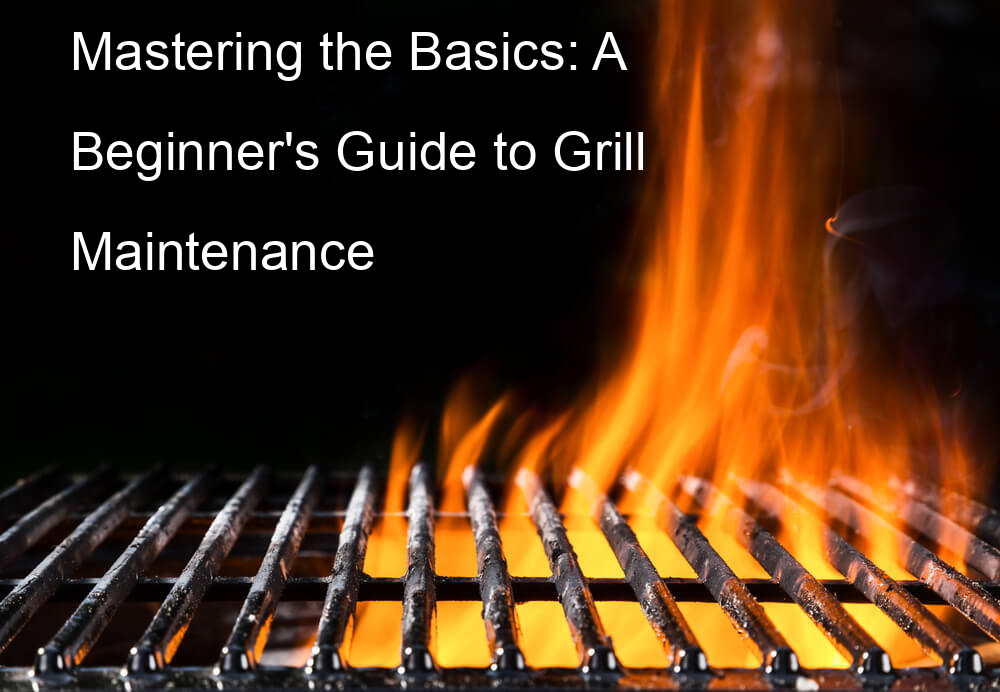Introduction to Grill Maintenance
Grill maintenance is an essential part of owning a grill. It not only ensures that your grill lasts longer, but also that it performs at its best every time you use it. In this section, we will discuss the importance of grill maintenance and help you understand the basics of it.
- Importance of Grill Maintenance
- Understanding the Basics of Grill Maintenance
Maintaining your grill is not just about keeping it clean. It’s about ensuring that it’s safe to use and that it’s performing at its peak. A well-maintained grill can last for many years, saving you the cost of frequent replacements. Moreover, regular maintenance also helps in preventing flare-ups, which can be dangerous. According to a Wikipedia article on barbecue grills, improper maintenance can lead to a buildup of grease and food particles, which can catch fire and cause serious accidents.
Grill maintenance involves regular cleaning, checking for any damages, and replacing parts as needed. It’s important to clean your grill after each use to prevent the buildup of grease and food particles. This includes cleaning the grates, the heat deflectors, and the interior of the grill. Checking for damages involves inspecting the grill for any signs of rust, cracks, or other damages that could affect its performance or safety. And finally, replacing parts as needed ensures that your grill continues to perform at its best. In the next sections, we will delve deeper into these aspects of grill maintenance.
Grill Cleaning Tips for Beginners
Keeping your grill clean is not only essential for maintaining its longevity, but it also ensures that your food tastes as good as it should. In this section, we will focus on BBQ grill maintenance, providing you with easy-to-follow steps on how to clean your BBQ grill and highlighting common mistakes to avoid during the cleaning process.
BBQ Grill Maintenance
Proper maintenance of your BBQ grill can extend its lifespan and enhance the flavor of your food. Here are some essential tips:
- How to clean a BBQ grill
- Common mistakes in BBQ grill cleaning
Start by preheating your grill for about 15 minutes to loosen up any grease or food particles. After it cools down, use a grill brush to scrub off the grime. For the grates, use a mixture of vinegar and water. Spray it on and let it sit for a few minutes before scrubbing. Don’t forget to clean the drip tray as well. Once you’re done, rinse everything with water and let it dry before your next grilling session.
One of the most common mistakes is not cleaning the grill regularly. Leaving it dirty can lead to a buildup of grease and food particles, which can affect the taste of your food and even cause a fire. Another mistake is using a wire brush, as the bristles can break off and end up in your food. It’s also important to avoid using harsh chemicals that can leave residues and affect the flavor of your food.
Remember, a clean grill is a happy grill. By following these tips, you can ensure that your BBQ grill stays in top shape and your food tastes delicious every time.
Outdoor Grill Maintenance
Outdoor grills are a fantastic way to cook food, but they require regular maintenance to keep them in top shape. Here, we will guide you through the process of preparing your grill for cleaning and provide a step-by-step guide to outdoor grill cleaning.
- Preparation for Cleaning an Outdoor Grill
- Step by Step Guide to Outdoor Grill Cleaning
- Scrub the Grates: Use the grill brush to scrub the grates. Make sure to clean both sides.
- Wash the Grates: Dip the grates in the bucket of warm soapy water and scrub them with the sponge. Rinse them with clean water and dry them with the towel.
- Clean the Grill Interior: Use the grill brush to scrub the interior of the grill. Wipe it down with a damp sponge.
- Clean the Grill Exterior: Wipe down the exterior of the grill with a damp sponge. Dry it with a towel.
- Reassemble the Grill: Once everything is clean and dry, reassemble the grill.
Before you start cleaning your outdoor grill, you need to gather the necessary cleaning materials. You will need a grill brush, a bucket of warm soapy water, a sponge, and a dry towel. Make sure the grill is cool before you start cleaning. Remove the grates and other removable parts. Use a grill brush to scrape off any loose debris.
Follow these steps to clean your outdoor grill:
Regular cleaning and maintenance will prolong the life of your outdoor grill and improve the quality of your grilling. Remember, a clean grill is a happy grill!
How to Maintain a Grill: A Comprehensive Guide
Grill maintenance is not just about keeping your grill looking good, it’s also about ensuring its longevity and optimal performance. Here, we will delve into the basics of grill maintenance.
Basic Grill Maintenance
Basic grill maintenance involves three key steps: regular cleaning, proper storage, and regular inspections. Let’s explore each of these in detail.
- Regular Cleaning
- Proper Storage
- Regular Inspections
Cleaning your grill after each use is crucial. It prevents the buildup of grease and food particles, which can lead to flare-ups and uneven heating. Use a grill brush to scrub the grates and remove any stuck-on food. Don’t forget to clean the inside of the grill as well, including the drip tray.
When not in use, store your grill in a dry, covered area to protect it from the elements. If you don’t have a covered area, consider investing in a grill cover. This will help prevent rusting and other weather-related damage.
Regularly inspect your grill for any signs of wear and tear. Check for any loose or damaged parts, and ensure that the gas lines (if applicable) are not leaking. If you notice any issues, address them promptly to prevent further damage.
By following these basic grill maintenance steps, you can keep your grill in top shape and enjoy delicious, perfectly-cooked meals for years to come.
Advanced Grill Maintenance
Once you’ve mastered the basics of grill maintenance, it’s time to take your skills to the next level. Advanced grill maintenance involves two key steps: replacing parts and deep cleaning. Let’s explore each of these in detail.
- Replacing Parts
- Deep Cleaning
Over time, certain parts of your grill may wear out and need to be replaced. This could include the grill grates, burners, or even the ignition system. It’s important to regularly inspect your grill and replace any parts that are worn or damaged. This not only ensures the longevity of your grill but also improves its performance.
When replacing parts, make sure to choose high-quality replacements that are compatible with your specific grill model. You can often find these at home improvement stores or online. Remember, safety first! Always turn off and disconnect your grill before replacing any parts. If you’re unsure about how to replace a part, consider hiring a professional or consulting your grill’s user manual.
Deep cleaning your grill is a crucial part of advanced maintenance. While regular cleaning helps to prevent build-up of grease and food particles, a deep clean is necessary to thoroughly remove any stubborn residue and prevent potential fire hazards.
Start by removing the grates and burners and soaking them in a solution of warm water and dish soap. While they’re soaking, use a grill brush to scrub the inside of the grill. Make sure to reach all corners and crevices. Once you’ve scrubbed every part, rinse them off and let them dry completely before reassembling your grill.
Deep cleaning should be done at least once a year, or more often if you grill frequently. Remember, a clean grill is a happy grill!
By following these advanced grill maintenance steps, you can ensure your grill stays in top shape for many years to come. Happy grilling!
Grill Care for Beginners
Whether you’re a seasoned grill master or a beginner, taking care of your grill is essential to its longevity and performance. This guide will provide you with the necessary tools and best practices for grill maintenance.
Grill Maintenance Guide
Grill maintenance is not as daunting as it may seem. With the right tools and a little bit of knowledge, you can keep your grill in top shape and ready for any BBQ event.
- Tools needed for grill maintenance
- Best practices in grill care
There are a few essential tools that you will need for effective grill maintenance. These include a grill brush for cleaning, a pair of tongs for handling food and coals, and a grill cover to protect your grill from the elements. You may also want to invest in a grill thermometer to ensure your food is cooked to the perfect temperature. Wikipedia has a comprehensive list of tools you might need.
Regular cleaning is one of the most important aspects of grill care. After each use, allow your grill to cool down and then remove any food residue with a grill brush. It’s also important to clean the grates and the inside of the grill regularly to prevent build-up. Additionally, always cover your grill when it’s not in use to protect it from the elements. Lastly, perform a safety check of your grill before each use, checking for any signs of wear and tear or damage.
Remember, a well-maintained grill not only lasts longer but also provides a better grilling experience. So, make grill care a part of your routine and enjoy delicious BBQ meals all year round.
Grill Upkeep for Beginners
Keeping your grill in top condition requires regular maintenance. This not only ensures your grill lasts longer, but also that your food tastes better. Let’s break down the tasks you should be doing on a monthly and seasonal basis.
-
Monthly Grill Upkeep Tasks
Monthly maintenance tasks are crucial to keep your grill functioning optimally. Here’s what you need to do:
- Clean the grates: After each use, clean the grates to remove any leftover food particles. This prevents build-up and keeps your grill in good condition. Use a grill brush for this task.
- Check for propane leaks: If you have a gas grill, check for propane leaks. You can do this by applying a light soap and water solution to the hose and turning on the gas. If bubbles form, you have a leak that needs to be fixed.
- Empty the grease tray: Over time, grease can accumulate in the tray and cause flare-ups. Empty it regularly to prevent this.
-
Seasonal Grill Upkeep Tasks
Seasonal tasks are performed less frequently, but are just as important for the longevity of your grill. Here’s what you need to do:
- Deep clean your grill: At the start of grilling season, give your grill a deep clean. This involves removing and cleaning the grates, burners, and other removable parts. You should also clean the inside of the grill.
- Inspect the grill: Look for signs of rust or damage. If you find any, it may be time to replace certain parts or the entire grill.
- Store your grill: If you won’t be using your grill during the colder months, store it properly. Cover it with a grill cover and store it in a dry place to protect it from the elements.
Remember, regular maintenance is the key to a long-lasting grill. By following these monthly and seasonal tasks, you’ll ensure your grill is always ready for your next barbecue.
Cleaning and Maintaining a Grill: Case Studies
Let’s delve into some real-life examples to better understand the importance of grill maintenance. These case studies will provide practical insights into maintaining different types of grills.
-
Case study 1: BBQ Grill Maintenance
Meet John, a BBQ enthusiast who loves hosting backyard parties. He owns a high-end BBQ grill, but he noticed that the grill’s performance was declining over time. The grill was not heating evenly, and the food’s flavor was not as good as before.
John decided to adopt a regular maintenance routine. He started by cleaning the grill grates after every use. He also made sure to clean the burner and tubes every month. He used a grill brush to remove any food residue and grease buildup. He also checked for any gas leaks regularly.
After a few weeks of this routine, John noticed a significant improvement in his grill’s performance. The food tasted better, and the grill was heating more evenly. This case study underscores the importance of regular cleaning and maintenance for BBQ grills.
-
Case study 2: Outdoor Grill Maintenance
Susan loves camping and outdoor cooking. She owns an outdoor grill that she uses for her camping trips. However, she noticed that the grill was starting to rust and the grates were getting harder to clean.
Susan decided to take action. She started by cleaning the grill after every use, removing any food particles and grease. She also made sure to dry the grill thoroughly to prevent rusting. She covered the grill when not in use to protect it from the elements.
After a few weeks, Susan noticed that her grill was in much better condition. The rust was gone, and the grates were easier to clean. This case study shows the importance of proper care and maintenance for outdoor grills.
As these case studies show, regular cleaning and maintenance can significantly improve the performance and longevity of your grill. Whether you own a BBQ grill or an outdoor grill, proper care is essential for the best cooking experience.
Conclusion: Mastering Grill Maintenance
As we wrap up this comprehensive guide on grill maintenance, it’s important to remember that a well-maintained grill not only lasts longer but also provides better tasting food. Let’s summarize the key takeaways and provide some final tips to help you master grill maintenance.
- Key takeaways
- Final tips for grill maintenance
1. Regular cleaning is crucial: Keep your grill clean after every use to prevent build-up of food particles and grease. This helps in maintaining the grill’s functionality and longevity.
2. Proper storage: Always store your grill in a dry and covered area to protect it from harsh weather conditions. This can significantly increase its lifespan.
3. Regular inspection: Regularly inspect your grill for any signs of wear and tear. Early detection can prevent major damages and costly repairs.
4. Use the right tools: Always use the right tools for cleaning and maintenance. This not only makes the process easier but also prevents any potential damage to the grill.
1. Always refer to the manufacturer’s instructions: Each grill is unique and may require specific care. Always refer to the manufacturer’s instructions for the best maintenance practices.
2. Invest in a good quality grill cover: A good quality grill cover can protect your grill from harsh weather conditions and increase its lifespan.
3. Use natural cleaning solutions: Consider using natural cleaning solutions like vinegar and baking soda. They are not only effective but also safe for the environment.
4. Schedule regular maintenance: Don’t wait for your grill to break down. Schedule regular maintenance to keep it in top shape.
In conclusion, mastering grill maintenance is not as daunting as it may seem. With the right knowledge and tools, you can easily keep your grill in top shape and enjoy delicious meals for years to come. Remember, a well-maintained grill is the secret to great grilling!






